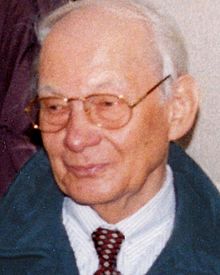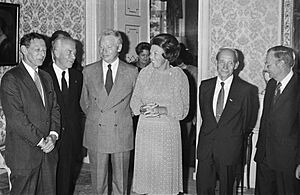Manfred Eigen facts for kids
Quick facts for kids
Manfred Eigen
|
|
|---|---|

Manfred Eigen, Göttingen 1996
|
|
| Born | 9 May 1927 |
| Died | 6 February 2019 (aged 91) Göttingen, Germany
|
| Nationality | German |
| Alma mater | University of Göttingen |
| Known for |
|
| Awards |
|
| Scientific career | |
| Fields | Biophysical chemistry |
| Institutions |
|
| Thesis | Ermittlung der molekularen Struktur reiner Flüssigkeiten und Lösungen aus thermischen und kalorischen Eigenschaften (1951) |
| Doctoral advisor | Arnold Eucken |
| Doctoral students | Geoffrey Hoffmann |
| Influences | Werner Heisenberg Arnold Eucken |

Manfred Eigen (born May 9, 1927 – died February 6, 2019) was a German biophysical chemist. This means he studied how physics and chemistry work together in living things. He won the 1967 Nobel Prize in Chemistry for his amazing work. He figured out how to measure very fast chemical reactions.
Eigen's research helped solve big problems in chemistry. It also helped us understand how chemical processes happen inside living organisms. Later in his life, he looked into how life and evolution first started. He helped create a special program at the Max Planck Institute. This program studied the basic building blocks of life at a tiny, molecular level. His work was praised for starting a new field called evolutionary biotechnology.
Contents
Early Life and Education
Manfred Eigen was born on May 9, 1927, in Bochum, Germany. His father, Ernst Eigen, was a musician. From a young age, Manfred loved music and played the piano.
World War II stopped his schooling. When he was fifteen, he had to join a German anti-aircraft unit. Near the end of the war, Soviet soldiers captured him. He later said escaping was quite easy. He walked hundreds of miles across Germany, reaching Göttingen in 1945. He didn't have the right papers for university. But he showed how smart he was in an exam and was accepted. He joined the first university class after the war.
Eigen wanted to study physics. But soldiers returning from the war got first choice. So, he studied Geophysics instead. He earned his first degree and then went on to study natural sciences. One of his teachers was Werner Heisenberg. Heisenberg was famous for his uncertainty principle, which is a key idea in physics. Eigen earned his doctorate degree in 1951.
Career and Research Discoveries
Manfred Eigen got his Ph.D. from the University of Göttingen in 1951. His supervisor was Arnold Eucken. In 1964, he shared his research findings at a meeting in London. He showed for the first time that you could measure how fast chemical reactions happen. He could measure reactions that took place in less than a billionth of a second!
In 1953, Eigen started working at the Max Planck Institute for Physical Chemistry in Göttingen. He became its director in 1964. He later combined it with another institute to form the Max Planck Institute for Biophysical Chemistry. He was also a special professor at the Braunschweig University of Technology. From 1982 to 1993, Eigen led the German National Merit Foundation. He was also on the board for The Bulletin of the Atomic Scientists.
In 1967, Eigen won the Nobel Prize in Chemistry. He shared it with Ronald George Wreyford Norrish and George Porter. They won for their studies on extremely fast chemical reactions. These reactions were started by very short bursts of energy.
Eigen also developed important theories about how life might have begun. These include the idea of quasispecies and the chemical hypercycle. The hypercycle describes how cycles of reactions could link together. This helps explain how self-organization happened in early life forms. He described this idea with Peter Schuster in 1977.
Eigen also started two biotechnology companies. These companies were called Evotec and Direvo. In 1981, he became a founding member of the World Cultural Council. Eigen was a member of the Pontifical Academy of Sciences, even though he was an atheist. He passed away on February 6, 2019, at 91 years old.
Personal Life
Manfred Eigen was married to Elfriede Müller. They had two children, a boy and a girl. Later, he married Ruthild Winkler-Oswatitsch. She was also a scientist and his long-time research partner.
Awards and Recognition
Manfred Eigen received many awards for his important research. Some of them include:
- Otto Hahn Prize (1962)
- Elected a member of the American Academy of Arts and Sciences (1964)
- Elected a member of the United States National Academy of Sciences (1966)
- Nobel Prize in Chemistry (1967)
- Elected a member of the American Philosophical Society (1968)
- Foreign Member of the Royal Society (1973)
- Pour le Mérite (1973)
- Faraday Lectureship Prize (1977)
- Lower Saxony State Prize for Science (1980)
- Paul Ehrlich and Ludwig Darmstaedter Prize (1992)
- Helmholtz Medal (1994)
- Max Planck Research Award (1994)
- Lifetime Achievement Award from the Institute of Human Virology (2005)
- Wilhelm Exner Medal (2011)
He also received 15 honorary doctorates from universities around the world. These special degrees recognized his great achievements in science.
See also
 In Spanish: Manfred Eigen para niños
In Spanish: Manfred Eigen para niños
 | Precious Adams |
 | Lauren Anderson |
 | Janet Collins |

